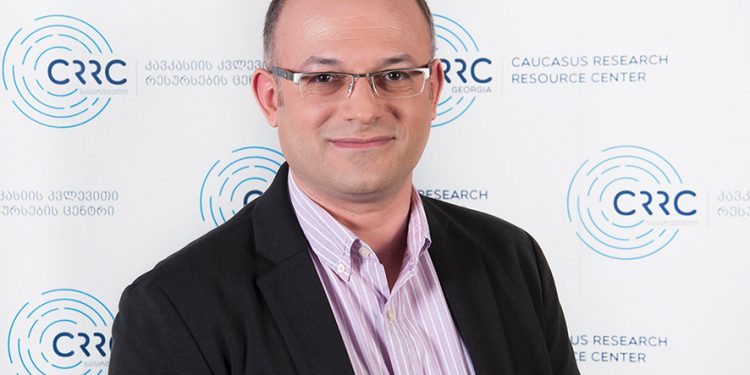Koba Turmanidze*, Director of the Caucasus Research Resource Center*, spoke with us about Georgian Dream and its political approach. He also discussed what we can expect this weekend from the elections.
How has Georgia’s economy developed under the Georgian Dream Party?
The economy is growing. Georgia had a 7% growth last year, which is quite a lot for a small nation. This doesn’t necessarily mean that people live better because, on top of the economic growth, there is a very large economic inequality. The wealth in the country, for example, is not distributed evenly, or even close to it. The wealth is usually concentrated in the top 1% of the population while a large part of the populace lives in poverty. This is why there are many individuals who migrate to the country, especially young people.
We are losing our future engine of democracy and our workforce. This is what Georgian Dream created, and it’s important for the upcoming elections.
Who do you predict will win the elections this weekend?
It’s still hard to say. Many people are still undecided. They are trying to decide between the ruling party and a few opposition parties. We Georgians do elections this way. Many people haven’t decided yet, and we could have some surprising results.
How has the situation changed with regard to emigration?
The trend has been upwards for the last few years. The number of emigrants is increasing. This is a bad sign. The economic hardship in Georgia is making people unhappy. The economy is not suffering as a whole, but the wealth hasn’t been distributed fairly. This is why people are looking for better places to live. There are no opportunities for young people in this area. There are not enough jobs, especially for the young, to provide a decent income. Moreover, staying in Europe offers more opportunities and is easier. These two factors have combined to increase the emigration rate of Georgians.
How rich or how poor is Georgian society today?
Around 20% of the population lives below the poverty level. Dependency on the state is not the same as poverty. We have an ageing population and a large part of them is dependent on state pensions or social aid. It is difficult to make a significant economic breakthrough when a large segment of the population is dependent on the government. You also have the emigration by younger cohorts.
What would you call poor in Georgian?
We have an outdated system. Poor people are people who don’t earn money and can’t feed themselves. Those people get social aid. Social aid is a small amount of money that helps people survive, around 60 GEL a month. It is a symbolic gift to families in extreme poverty. They usually have some money, but try to hide it to avoid losing their aid.
Are people satisfied with the ruling party?
The Georgian Dream supporters view the world through the lens of their party, i.e. The Georgian Dream supporters see the world in a much more positive light than those who do not support their party. You will find that Georgian Dream supporters are more satisfied with the policies of Georgian Dream. Their supporters believe Georgian Dream is pro-European and will take our country to the European Union. Georgian Dream tells voters this. But, of course the opposition supporters see the situation in a very different way.
Many people say that they will vote for GD because they promise peace, but their pensions are too low.
Yes. This is a real problem. People may not think about social and economic issues but instead rely on problems they have created. They see peace but not because Georgian Dream made it so: this is how Georgia would look no matter who was the power. It doesn’t mean that if Georgian Dream wins, there will be war, as they are being told. Unfortunately, the Georgian Dream campaign does not deal with real-life issues but rather propaganda and made-up ones.
Does the opposition address the concerns of people about their everyday lives?
All the opposition parties are using strong words at this moment. They say things, make promises, and present programs and ideas. They promise a lot but the issue is their credibility. We’re used to hearing a lot from all parties – including the ruling party – that are never fulfilled. Yes, the opposition has been trying to address these issues. It could be a credibility issue, since words are cheap.
The ruling party hoped to gain more votes by passing a law that was anti-LGBT. Does this resonate with Georgian society?
It’s difficult to say. Georgian Dream could have easily won these elections if it hadn’t passed “Russian Law,” which they call foreign influence transparency laws, and if it hadn’t even raised the issue of the LGBTQ+ community. They were doing well; they had achieved EU Candidate status; the economy was doing well, and as they say, there is peace. They could have won by claiming these positive things for themselves. They started a law that the majority of the population did not like. I’m not saying they are all against the LGBT law but it does matter to them. To compensate for the dissatisfaction with the Russian law which upset a large part of the population they began to invent war scenarios that evolved into anti EU and anti LGBT rhetoric. They deliberately shifted focus from tangible and real things, such as the EU candidate status, the economic benefits and better social protection for individuals, to things which are hard to measure, understand and even see. They invented the “global party” that is “fighting us” and invented that Western countries were pushing us to attack Russia and open a secondfront. There is no evidence to support this, and there is no reason for their supporters to rally around issues that are irrelevant and cannot improve people’s lives, because they don’t even exist.
Why did they do it?
It’s a mystery, mainly because they had a clear route to another four years at the top. They made enemies out of the blue in early spring.
Will the introduction of “Russian law” if implemented affect many people?
In our surveys, despite the government’s power and propaganda, the ruling party has never won a majority in favor of this law. They want to use this law at least to control civil society, to eliminate troublemakers, and to control foreign money that comes into these organizations. This is a Russian approach.
What role does the church play in this situation
In our surveys, it is clear that the Church is the most respected institution. Georgian believers place a high level of trust in the Church, and especially the Patriarch. Therefore, the Church’s attitude, whether it is directly or indirectly expressed, is important. The Church is powerful and smart enough to not put all of its eggs in one basket. They are playing a clever political game, not showing their support to any one political force. They want to get the best possible deal.
* * *
* Koba Turkmanidze is a member of CRRC-Georgia’s staff since 2007. He holds a PhD in Comparative Politics at Central European University. CRRC-Georgia, a non-profit, non-governmental research organization, collects, analyses and publishes data relevant to policy on social, political and economic trends in Georgia. CRRC Georgia, along with CRRC Armenia and CRRC Azerbaijan, forms a network of research centres with a common goal to strengthen social science research and policy analysis in South Caucasus.
The Eurasia Partnership Foundation, with the financial support of the Carnegie Corporation of New York, established the three centers in 2003. In 2013, CRRC Georgia and CRRC Armenia were registered as non-commercial legal entities.
Interview with Tatjana Montik
Read More @ georgiatoday.ge




